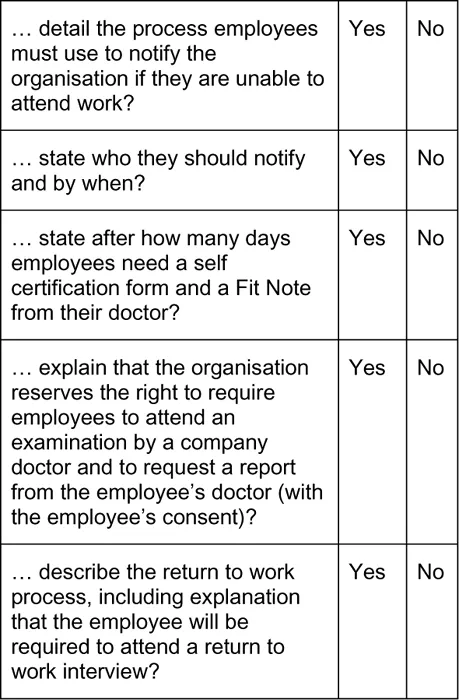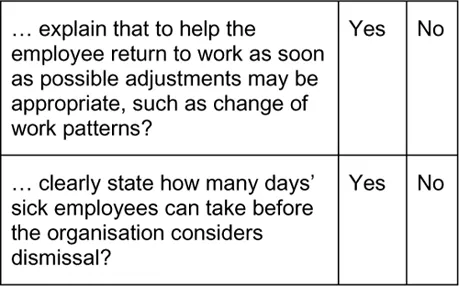
eBook - ePub
Coping with Unplanned Absences
A Pocket Guide
Sarah Cook
This is a test
Share book
- 46 pages
- English
- ePUB (mobile friendly)
- Available on iOS & Android
eBook - ePub
Coping with Unplanned Absences
A Pocket Guide
Sarah Cook
Book details
Book preview
Table of contents
Citations
About This Book
This pocket guide, based on best practice guidelines, looks at what you can do to ensure your employees fulfil their obligations and turn up as required. It then gets to grips with the question of how your organisation should handle unplanned absences before and when they arise.
Frequently asked questions
How do I cancel my subscription?
Can/how do I download books?
At the moment all of our mobile-responsive ePub books are available to download via the app. Most of our PDFs are also available to download and we're working on making the final remaining ones downloadable now. Learn more here.
What is the difference between the pricing plans?
Both plans give you full access to the library and all of Perlego’s features. The only differences are the price and subscription period: With the annual plan you’ll save around 30% compared to 12 months on the monthly plan.
What is Perlego?
We are an online textbook subscription service, where you can get access to an entire online library for less than the price of a single book per month. With over 1 million books across 1000+ topics, we’ve got you covered! Learn more here.
Do you support text-to-speech?
Look out for the read-aloud symbol on your next book to see if you can listen to it. The read-aloud tool reads text aloud for you, highlighting the text as it is being read. You can pause it, speed it up and slow it down. Learn more here.
Is Coping with Unplanned Absences an online PDF/ePUB?
Yes, you can access Coping with Unplanned Absences by Sarah Cook in PDF and/or ePUB format, as well as other popular books in Business & Human Resource Management. We have over one million books available in our catalogue for you to explore.
Information
CHAPTER 1: INTRODUCTION
Why this pocket guide?
When a member of staff is unexpectedly absent from work it raises immediate cause for concern with regard to:
• the likelihood of missing deadlines
• disruption to the quality and continuity of service delivery
• increased workload and pressure for team members who take on other’s work
• time invested by managers and team leaders in resourcing and HR issues
• costs involved in hiring temporary or replacement staff
• loss of productivity and efficiency
• drop in motivation and employee engagement and commitment
• decrease in internal and external customer satisfaction and retention
• reputational risk for the organisation of not providing an excellent service.
The annual cost of unplanned absenteeism is estimated to run to between £10 and £12 billion in the UK. On average, each employee has 8.3 days’ unplanned absence from work each year. Studies show that unauthorised absence is most likely to occur in certain groups, such as younger people, new starters, manual workers and people who work in larger organisations where absenteeism is not so readily noticed. However, recent force majeure events, such as bad weather and airport closures have proven that unplanned absenteeism can affect many thousands of people in businesses across the globe.
In this book I offer practical advice to help you better manage unplanned absences, so as to minimise the impact on you, your colleagues and team members, your customers and business reputation.
Reasons for absence
Let’s start by considering the causes of absence from work, remembering that there are many valid reasons why people can be absent. These include authorised holidays, compassionate leave, time off to care for dependents, paternity and maternity leave, adoption and parental leave, study leave, as well as time off for jury service and trade union duties. Employees have a legal right to be absent for these and many other reasons. If you are unsure about employee rights, a good source of reference is the Acas website: www.acas.org.uk.
The focus of this book is unauthorised, unplanned absence. This can be caused by short- or long-term sickness, including stress, persistent lateness or ‘duvet days’, where employees decide not to show for work. Sometimes called ‘Monday morning syndrome’, this type of absence may be linked to major sporting events or national holiday periods e.g. taking an unplanned absence either side of a Bank Holiday. It can also be caused by external factors, such as weather and travel disruption.
Preparation to prevent being caught out
There are a number of practical actions that you and your organisation can take to minimise the incidence of unplanned absence and to ensure the smooth operation of your business, should unplanned absenteeism occur.
Step 1: Ensure that expectations of attendance are set out in employee contracts
Make sure that employee contracts of employment refer to regular and punctual attendance and that the agreed attendance times are clear. This will reduce any risk of the employee claiming that there was flexibility on hours of attendance, if this was not the case.
Step 2: Have a clear absence management policy
A fundamental step is to ensure that your organisation has a clear policy in place that outlines information on employee terms and conditions relating to taking time off work. This is a legal requirement and should be made clear to all employees. Typically, this policy is contained in an employee handbook. I suggest that you find a copy of this (or ensure one is created) now.
Check that your policy is comprehensive. In addition to legislative details, such as statutory sick pay and contractual sick play, does your policy:
Table 1: Assess your absence
management policy
management policy


Now is a good time to review your policy to identify how your policy and procedures cover employees who are absent due to circumstances beyond their control (the closure of airports because of the volcanic ash eruption is one example). Does your policy make it clear where the employee stands? Does time lost need to be taken as holiday entitlement, for example? Is it clear what the reporting and return to work arrangements will be?
Step 3: Ensure that line managers, team leaders and supervisors, as well as team members, are aware of the policy
Having a robust HR policy is all very ...